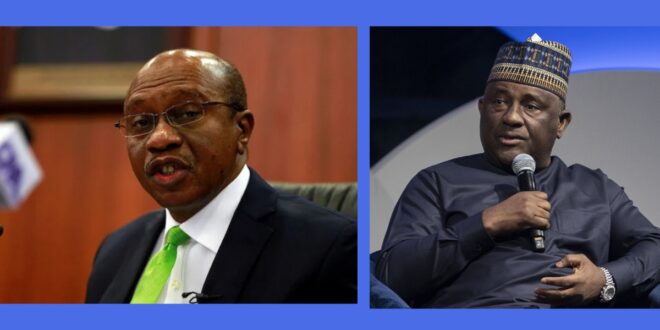...To get all news updates, Join our WhatsApp Group (Click Here)
Also Join our WhatsApp Channel (Click Here)
Some by innovation become billionaire, others through stint of luck and fortune in their stars but for the likes of BUA founder, Mr Abdulsamad Rabiu, his billionaire status came by cheating the entire Nigerian financial system aided by an alleged Central Bank of Nigeria (CBN) Governor, Mr Godwin Emefiele, who has now been suspended by the West Africa country’s President, Bola Ahmed Tinubu over corruption allegations. While Nigerian celebrates with Rabiu for being named among the world’s richest men by Forbes, what they never knew was that the billionaire empire he proudly flaunts was pummelled by the foreign currency domiciled in CBN which he borrowed at will using the official rate while smiling to the bank converting it to the black market rate and rerouting it to build his many factories.
A SecretReporters investigation going through heaps of financial transactions in the year 2016 between CBN and BUA Group shows the massive credit from the Nigeria apex bank to Rabiu’s BUA. On 8th January, the CBN governor ordered the transfer of N1,382,500,000 being forex purchase to Rabiu’s company.
On 18th January, BUA international purchased the dollar equivalent of N386,799,033.70 using the official rate of N199 while black market rate was selling for N495. On the same day, Emefiele ordered another disbursement of forex worth N520,217,528 to BUA. Another N1,382,500,000 was also sent on the same day as well as 22nd January.
On 22nd January, another N386,799.033 and N520,217,528 was again wired from CBN account in forex to BUA. On 15th February, similar disbursement of N386,799.033, N1,382,500,000 and N520,217,528 left the nation’s account to BUA. Similarly on 23rd February, N386,799.033 and N520,217,528 made BUA International smile on the order of Emefiele. Same would repeat itself again on 2nd March when the company got another lodgement of N386,799.033 and N520,217,528. On 11th March, BUA further purchased $12,282,002 in double tranches from CBN while on 23rd March, $29,625,000 was also moved from CBN to the government fed billionaire to its BUA Sugar Refinery account to Ecobank account number 9992021618. On 31st March, the country’s foreign reserved depleted with $49,375,000 from CBN to BUA into its Ecobank account number 9992023306. Via its GTB account 214161839, USD sale of forex at the official rate of N197.5 worth N2 billion was again given to the company by CBN. Via CBN intervention fund when the company was financially viable, the sum of N392,034,060 in three tranches was paid to BUA Sugar Refinery using the official rate of N198 to its Stanbic IBTC account number 11889618. Troves of these financial documents saw over N40 billion given alone to BUA in the year 2016 with the active connivance of Emefiele. SecretReporters will be bringing in details all the years in series on how CBN and not by dint of hardwork turned the Northern born businessman to a global billionaire, while it ignored thousands of others who applied for the same forex. Share
– Secrets Reporter
You can get every of our news as soon as they drop on WhatsApp ...To get all news updates, Join our WhatsApp Group (Click Here)
Also Join our WhatsApp Channel (Click Here)

















